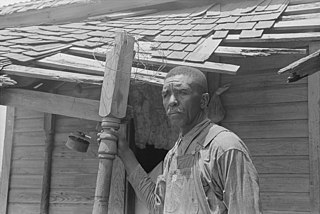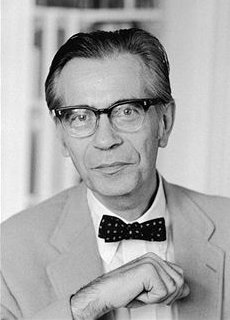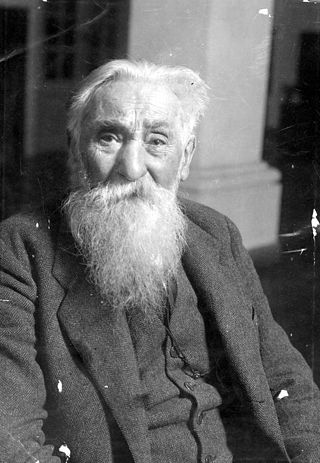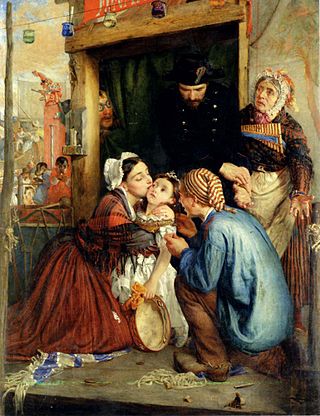Related Research Articles
Agrarianism is a social and political philosophy that has promoted subsistence agriculture, family farming, widespread property ownership, and political decentralization. Adherents of agrarianism tend to value traditional bonds of local community over urban modernity. Agrarian political parties sometimes aim to support the rights and sustainability of small farmers and poor peasants against the wealthy in society.

A farmer is a person engaged in agriculture, raising living organisms for food or raw materials. The term usually applies to people who do some combination of raising field crops, orchards, vineyards, poultry, or other livestock. A farmer might own the farm land or might work as a laborer on land owned by others. In most developed economies, a "farmer" is usually a farm owner (landowner), while employees of the farm are known as farm workers. However, in other older definitions a farmer was a person who promotes or improves the growth of plants, land or crops or raises animals by labor and attention.

A peasant is a pre-industrial agricultural laborer or a farmer with limited land-ownership, especially one living in the Middle Ages under feudalism and paying rent, tax, fees, or services to a landlord. In Europe, three classes of peasants existed: non-free slaves, semi-free serfs, and free tenants. Peasants might hold title to land outright, or by any of several forms of land tenure, among them socage, quit-rent, leasehold, and copyhold.
A land ethic is a philosophy or theoretical framework about how, ethically, humans should regard the land. The term was coined by Aldo Leopold (1887–1948) in his A Sand County Almanac (1949), a classic text of the environmental movement. There he argues that there is a critical need for a "new ethic", an "ethic dealing with human's relation to land and to the animals and plants which grow upon it".

A tenant farmer is a person who resides on land owned by a landlord. Tenant farming is an agricultural production system in which landowners contribute their land and often a measure of operating capital and management, while tenant farmers contribute their labor along with at times varying amounts of capital and management. Depending on the contract, tenants can make payments to the owner either of a fixed portion of the product, in cash or in a combination. The rights the tenant has over the land, the form, and measures of payment vary across systems. In some systems, the tenant could be evicted at whim ; in others, the landowner and tenant sign a contract for a fixed number of years. In most developed countries today, at least some restrictions are placed on the rights of landlords to evict tenants under normal circumstances.

The Irish National Land League was an Irish political organisation of the late 19th century which sought to help poor tenant farmers. Its primary aim was to abolish landlordism in Ireland and enable tenant farmers to own the land they worked on. The period of the Land League's agitation is known as the Land War. Historian R. F. Foster argues that in the countryside the Land League "reinforced the politicization of rural Catholic nationalist Ireland, partly by defining that identity against urbanization, landlordism, Englishness and—implicitly—Protestantism." Foster adds that about a third of the activists were Catholic priests, and Archbishop Thomas Croke was one of its most influential champions.

La Vía Campesina is an international farmers organization founded in 1993 in Mons, Belgium, formed by 182 organisations in 81 countries, and describing itself as "an international movement which coordinates peasant organizations of small and middle-scale producers, agricultural workers, rural women, and indigenous communities from Asia, Africa, America, and Europe".

Richard Hofstadter was an American historian and public intellectual of the mid-20th century. Hofstadter was the DeWitt Clinton Professor of American History at Columbia University. Rejecting his earlier historical materialist approach to history, in the 1950s he came closer to the concept of "consensus history", and was epitomized by some of his admirers as the "iconic historian of postwar liberal consensus." Others see in his work an early critique of the one-dimensional society, as Hofstadter was equally critical of socialist and capitalist models of society, and bemoaned the "consensus" within the society as "bounded by the horizons of property and entrepreneurship", criticizing the "hegemonic liberal capitalist culture running throughout the course of American history".

The Age of Reform is a 1955 Pulitzer Prize-winning book by Richard Hofstadter. It is an American history, which traces events from the Populist Movement of the 1890s through the Progressive Era to the New Deal of the 1930s. The Age of Reform stands out from other historical material because Hofstadter's main purpose for writing is not to retell an extensive history of the three movements, but to analyze the common beliefs of the reform groups in our modern perspective to elucidate historical distortions, most notably between the New Deal and Progressivism.
The Whiteboys were a secret Irish agrarian organisation in 18th-century Ireland which defended tenant-farmer land-rights for subsistence farming. Their name derives from the white smocks that members wore in their nighttime raids. Because they levelled fences at night, they were usually called "Levellers" by the authorities, and by themselves "Queen Sive Oultagh's children", "fairies", or followers of "Johanna Meskill" or "Sheila Meskill". They sought to address rack-rents, tithe-collection, excessive priests' dues, evictions, and other oppressive acts. As a result, they targeted landlords and tithe collectors. Over time, Whiteboyism became a general term for rural violence connected to secret societies. Because of this generalization, the historical record of the Whiteboys as a specific organisation is unclear. Three major outbreaks of Whiteboyism occurred: in 1761–1764, 1770–1776, and 1784–1786.

Ribbonism, whose supporters were usually called Ribbonmen, was a 19th-century popular movement of poor Catholics in Ireland. The movement was also known as Ribandism. The Ribbonmen were active against landlords and their agents, and opposed "Orangeism", the ideology of the Protestant Orange Order.

The history of Ireland from 1691–1800 was marked by the dominance of the Protestant Ascendancy. These were Anglo-Irish families of the Anglican Church of Ireland, whose English ancestors had settled Ireland in the wake of its conquest by England and colonisation in the Plantations of Ireland, and had taken control of most of the land. Many were absentee landlords based in England, but others lived full-time in Ireland and increasingly identified as Irish.. During this time, Ireland was nominally an autonomous Kingdom with its own Parliament; in actuality it was a client state controlled by the King of Great Britain and supervised by his cabinet in London. The great majority of its population, Roman Catholics, were excluded from power and land ownership under the penal laws. The second-largest group, the Presbyterians in Ulster, owned land and businesses but could not vote and had no political power. The period begins with the defeat of the Catholic Jacobites in the Williamite War in Ireland in 1691 and ends with the Acts of Union 1800, which formally annexed Ireland in a United Kingdom from 1 January 1801 and dissolved the Irish Parliament.

Bolesław Limanowski was a Polish socialist politician, as well as historian and journalist and advocate of Agrarianism. He was one of the first people to promote socialist ideas in Poland.

An agrarian system is the dynamic set of economic and technological factors that affect agricultural practices. It is premised on the idea that different systems have developed depending on the natural and social conditions specific to a particular region. Political factors also have a bearing on an agrarian system due to issues such as land ownership, labor organization, and forms of cultivation.

From the 1680s to 1789, Germany comprised many small territories which were parts of the Holy Roman Empire of the German Nation. Prussia finally emerged as dominant. Meanwhile, the states developed a classical culture that found its greatest expression in the Enlightenment, with world class leaders such as philosophers Leibniz and Kant, writers such as Goethe and Schiller, and musicians Bach and Beethoven.

In historiography, rural history is a field of study focusing on the history of societies in rural areas. At its inception, the field was based on the economic history of agriculture. Since the 1980s it has become increasingly influenced by social history and has diverged from the economic and technological focuses of "agricultural history". It can be considered a counterpart to urban history.
The Narodniks were a politically conscious movement of the Russian intelligentsia in the 1860s and 1870s, some of whom became involved in revolutionary agitation against tsarism. Their ideology, known as Narodism, Narodnism or Narodnichestvo, was a form of agrarian socialism though it is often misunderstood as populism.
Agrarian socialism is a political ideology that promotes social ownership of agrarian and agricultural production as opposed to private ownership. Agrarian socialism involves equally distributing agricultural land among collectivized peasant villages. Many agrarian socialist movements have tended to be rural, locally focused, and traditional. Governments and political parties seeking agrarian socialist policies have existed throughout the world, in regions including Europe, Asia, North America, Latin America, and Africa.

Captain Rock was a mythical Irish folk hero, and the name used for the agrarian rebel group he represented in the south-west of Ireland from 1821 to 1824.

French peasants were the largest socio-economic group in France until the mid-20th century. The word peasant, while having no universally accepted meaning, is used here to describe subsistence farming throughout the Middle Ages, often smallholders or those paying rent to landlords, and rural workers in general. As industrialization developed, some peasants became wealthier than others and drove investment in agriculture. Rising inequality and financial management in France during the late 18th century eventually motivated peasants to revolt and destroy the feudal system. Today peasants could no longer be said to exist as an economic or social group in France. although many attempts have been made to honor and preserve this traditional way of life.
References
- ↑ Thompson, Paul (2010). "Interview Eighteen". In Ryne Raffaelle; Wade Robinson; Evan Selinger (eds.). Sustainability Ethics: 5 Questions. United States: Automatic Press.
- ↑ Pitirim A. Sorokin, et al., eds. A systematic source book in rural sociology (1930) vol 1 pp. 24–52
- ↑ Paul H. Johnstone, "Turnips and Romanticism," Agricultural History, Vol. 12, No. 3 (Jul., 1938), pp. 224–255 in JSTOR
- ↑ Deutsch, Eliot; Ronald Bontekoei (1999). A companion to world philosophies . Wiley Blackwell. p. 183. ISBN 9780631213277.
- ↑ Sellmann, James Daryl (2010). Timing and rulership in Master Lü's Spring and Autumn annals. SUNY Press. p. 76.
- 1 2 Denecke, Wiebke (2011). The Dynamics of Masters Literature: Early Chinese Thought from Confucius to Han Feizi. Harvard University Press. p. 38.
- ↑ Steiner (2003) p62
- ↑ Derk Bodde (2005). "Chinese Ideas in the West" (PDF). Columbia University . Retrieved 2013-06-08.
- ↑ Thomas Jefferson: Letter to John Jay August 23, 1785
- ↑ Wilson, Thomas D. The Oglethorpe Plan: Enlightenment Design in Savannah and Beyond. Charlottesville, VA: University of Virginia Press, 2012, pp. 50, 57-59, 70-71, 187-192.
- ↑ Richard Hofstadter, The Age of Reform (1955)
- ↑ W. Burlie Brown, "The Cincinnatus Image in Presidential Politics," Agricultural History Vol. 31, No. 1 (Jan., 1957), pp. 23–29 in JSTOR
- ↑ Terry Mulhall (1993). The State and Agrarian Reform: The Case of Ireland 1800-1940. University of London.
- ↑ James S. Donnelly, Irish Agrarian Rebellion: The Whiteboys of 1769-76 (Royal Irish Academy, 83C, 1983), pp. 293-296.
- ↑ James S. Donnelly, The Great Irish Potato Famine (Gloucestershire, The History Press, 2012, p. 4.
- ↑ James S. Donnelly, "Captain Rock: The Origins of the Irish Agrarian Rebellion of 1821-24," New Hibernia Review (2007) 11#1 pp. 47-72.
- ↑ Frank Bourgholtzer, "Aleksandr Chayanov And Russian Berlin," Journal of Peasant Studies, July 1999, Vol. 26 Issue 4, pp. 13–53
- ↑ Kenneth D. Barkin, "Conflict and Concord in Wilhelmian Social Thought," Central European History March 1972, Vol. 5 Issue 1, pp. 55–71
- ↑ K. J. Cottam, "Boleslaw Limanowski, A Polish Theoretician Of Agrarian Socialism," Slavonic and East European Review, Jan 1973, Vol. 51 Issue 122, pp. 58–74
- ↑ Isaiah Berlin, "The Populists' Moral Condemnation of Russia Political and Social Systems," in Arthur E. Adams, ed. Problems of European Civilization: Imperial Russia after 1861 (1965)
- ↑ Hannu Immonen, The Agrarian Program of the Russian Socialist Revolutionary Party, 1900–1911 (1988).
- ↑ K.J. Cottam, "Boleslaw Limanowski, A Polish Theoretician of Agrarian Socialism," Slavonic and East European Review (1973) 51#122 pp. 58–74 in JSTOR
- ↑ "Irene Parlby and the United Farmers of Alberta". The Canadian Encyclopedia . 1921-07-18. Retrieved 2013-06-08.
- ↑ Ian Macpherson (1941-06-10). "Henry Wise Wood". The Canadian Encyclopedia . Archived from the original on May 18, 2004. Retrieved 2013-06-08.
- ↑ Jeffery M. Taylor, "The Language of Agrarianism in Manitoba, 1890–1925," Labour / Le Travail, Spring 1989, Vol. 23, pp. 91–118
- ↑ David Demeritt, "Visions of Agriculture in British Columbia," BC Studies, Winter 1995, Issue 108, pp. 29–59
- ↑ Roderick Nash, Wilderness and the American Mind (4th ed. 2001, Yale U.P.)
- ↑ Alexandra Kindell, “Washingtonian Agrarianism: Antebellum Reformers and the Agrarian Image of George Washington,” American Nineteenth Century History 13 (Sept. 2012), 347–70.
- ↑ I'll Take My Stand, Introduction: A Statement Of Principles, Southern Agrarians
- ↑ Curt Meine, Aldo Leopold: His Life and Work (University of Wisconsin Press, 1988)
- ↑ The Agriculture, Food, and Community Ethics Website
- ↑ Thompson, Paul. 2010. The Agrarian Vision. Lexington: The University of Kentucky Press.